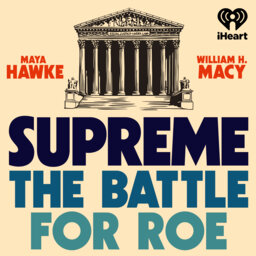Ep 10: Bonus - The Conversation
Series Creator Aaron Tracy speaks with Pulitzer Prize-winning author Linda Greenhouse, who reported on the Supreme Court for The New York Times for 30 years.
In 1 playlist(s)
Supreme: The Battle for Roe
At 26 years old, Sarah Weddington stands in a courtroom for the first time in her life and argues th…Social links
Follow podcast
Recent clips

Ep 09: The Most Controversial Man in America
31:01

Ep 08: When Harry Met Sarah
26:53

Ep 07: Marble Palace
27:22
 Supreme: The Battle for Roe
Supreme: The Battle for Roe